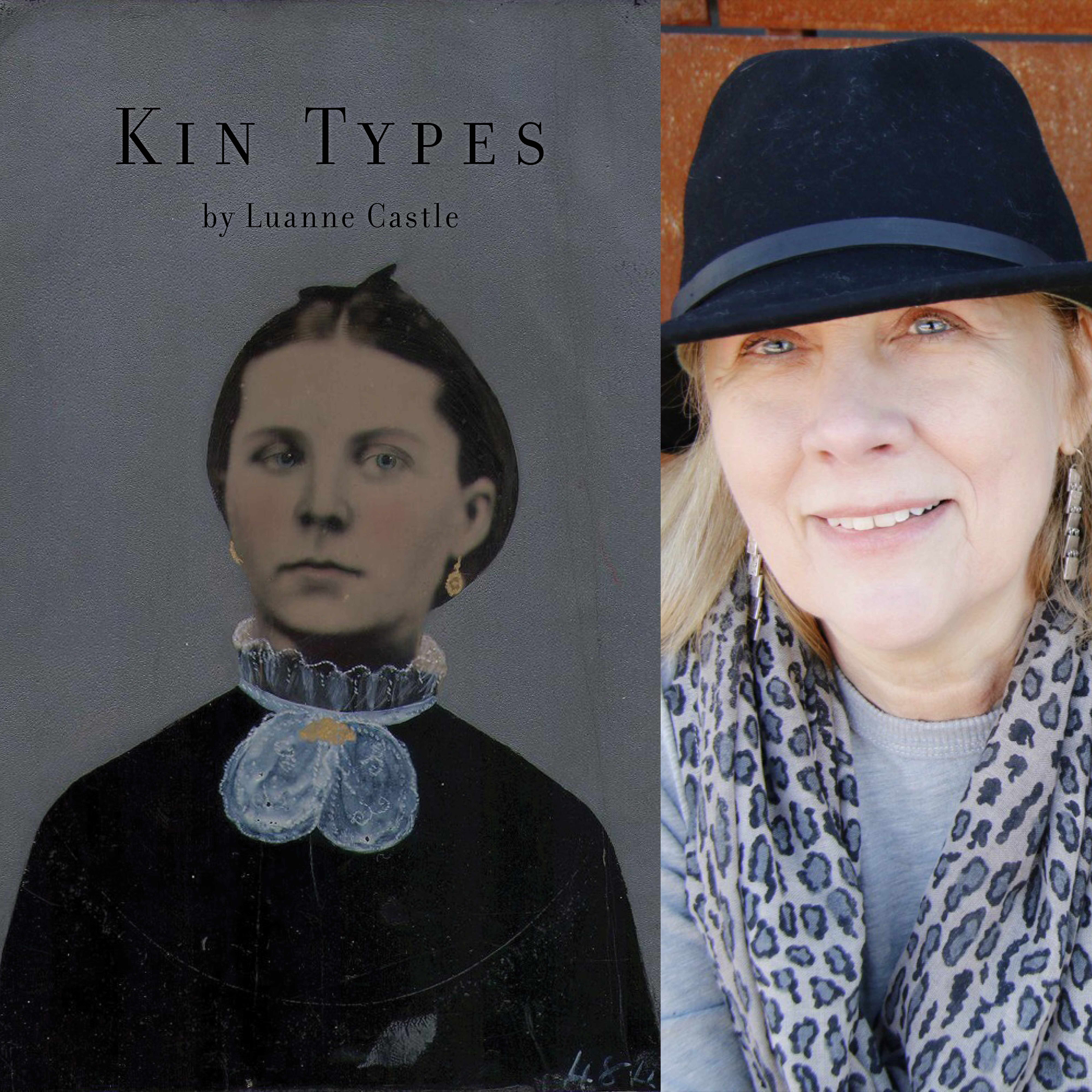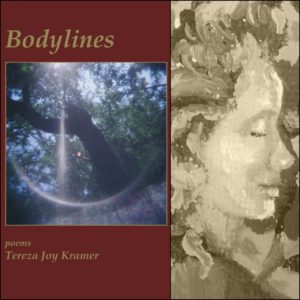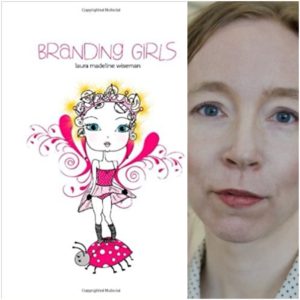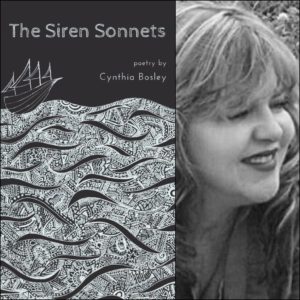Kin Types by Luanne Castle
$14.99
Welcome to Luanne Castle’s Kin Types, where every piece, poem or prose, is a ghost –-but not the sort you can see through. You see, Castle’s ghosts have been resurrected through powerful emotion and startling detail, have been made suddenly solid and real again with a skill that brings to mind the work of Edgar Lee Masters. Herein we find all the heart and heartbreak of ordinary lives from the past finally valuated properly, given their own set of lines and stanzas, their own sentences and paragraphs, the attention and care of a gifted and sympathetic writer. Which is to say, you’re going to want to stick around for a while. Kin Types exists at the precise place where literature and history intersect to make something both beautiful and true.
–Justin Hamm, author of American Ephemeral, editor of the museum of americana
Luanne Castle’s Kin Types is based largely upon genealogy and a fascination with what comes to all of us from the past. A mix of poetry in the traditional sense and highly poetic prose pieces, the collection takes the reader on a journey into the lives of women and somewhat into the lives of men who must carry on alone once the women are gone. The journey of this collection is not a ramble into the past, but a slingshot into the here and now by way of these portrait tales.
Of particular importance to readers are these lines from
What Lies Inside:
What lies outside my mind is nothing. Mother’s bones cleaner
than steak bones, buildings diminish to the horizon.
Inside my mind
a junkyard, castoffs from outside others,
flickering and igniting when struck on its inside walls.
Clearly, Castle is letting us know that she (and we) are all inhabited by stories of our ancestors.
Castle explores the warnings and quirks of relatives in poem after poem. Perhaps Castle is also issuing a warning in Advice From My Forebears to those whose lives are lived by the word and pen: Don’t quit writing like I did. Make me a promise. The whole collection is a promise, and not to be missed, whether for its flashlight into the past or its beam into the future.
–Carol Willette Bachofner, Poet Laureate Emerita of Rockland, Maine
Description
Kin Types
by Luanne Castle
$14.99, paper
978-1-63534-254-3
2017
Winner of the 2015 New Mexico-Arizona Book Award, Doll God, Luanne Castle‘s first collection of poetry, was published by Aldrich Press. Luanne’s poetry and prose have appeared in Grist, Copper Nickel, River Teeth, Glass: A Journal of Poetry, Barnstorm Journal, Six Hens, Lunch Ticket, The Review Review, and many other journals. Luanne has studied English and creative writing at the University of California, Riverside; Western Michigan University; and Stanford University. She divides her time between California and Arizona.






Carla McGill (verified owner) –
Most people enjoy hearing family stories, narratives about one’s own ancestors and also those of others. We instinctively know that people from the past have something to teach us, that we will learn something about ourselves and about history from hearing stories about them. The new chapbook by Luanne Castle, Kin Types (Finishing Line Press, 2017), is an inventive approach to family narratives and a suitable collection to follow Doll God (Aldrich Press, 2015), her first book of poetry. That collection encompasses aspects of her own childhood and adult life, and this one features sketches of late relatives in both poetry and prose.
Long an archivist of her genealogical history in both photographs and narratives, Castle has done something extraordinary here with the information she has gathered over the years. Capturing ideas about genetic memory and the prevalence of ancestral traits in one’s being, she has created nineteen sketches that offer glimpses of painful incidents, overlooked aspects of family scenes, and features of individual characters that will resonate with readers who have heard similar stories via the domestic oral tradition. True to form in the Castle milieu, both God and the devil are in the details.
Even the first poem, “Advice from My Forebears,” offers hints at the larger stories in brief phrases: “Make up your mind what church you’ll attend/and go there as often as you can stand,” and “Don’t grab a burning oil stove without considering/the consequences.” In an intelligently placed arrangement, the stove appears in the second poem, “An Account of a Poor Oil Stove Bought off Dutch Pete,” an evocative account of the tragic burning of Aaltje Paak DeKorn, 1852-1908, who heard children screaming and ran to help them, embracing the burning stove:
Did she take note here?
This is the moment my life changes.
I can’t finish the dishes, wash my unmentionables,
get dinner ready for Dirk and the children before
it’s too late. It’s going to happen.
It’s happening now.
She jumps into a “cistern, a water-holding pit, not a well,” and “Hands of all sizes reach for her.” As she “rises a glistening babe, old flesh separates from unborn flesh. She stands before them peeled.” The riveting story is heightened by Castle’s imagery of her apron, which “blooms into a billowing sail” as she runs, and the “sliced strawberries centered on the oilcloth nailed to the tabletop,” seen in the smoke.
Perhaps it is the thrill of the image that will captivate readers, as it did me, and along with it the intriguing history of the people, many who immigrated to the United States from the Netherlands and Germany. In “New Life, New Music,” the blend of both content and style produce a frisson of emotion. The subject of this poem, Jennegien Bomhoff Zuidweg, 1838-1924, whose age is revealed by her “many wrinkles,” notices a boy:
His dark blond curls were so
like her brother Lucas when a baby
and not yet the young man she kissed
in his black coffin.
The poem, “Someone Else’s Story,” is remarkable for its depiction of the life of Caroline Meier Waldeck, 1872-1946, and demonstrates Castle’s ability to poetically express the nuances and meaning in the life of an individual, a “wife/and mother alone with strangers,” who has to work for them “skimming/milk and scraping her knuckles on the washboard,” after her husband is committed to an asylum. She hears the strangers speak about her “as if she/were a cow hobbled for the sake of her calf.”
Better not to think of these things and to study
late at night her correspondence course.
Work study work study. She was no cow.
The varied assortment of approaches enriches this collection, offering surprises and multiple perspectives, as if we are seeing painful private moments along with public opinion, outside points of view. We learn in “What Came Between A Woman and Her Duties” about Mrs. Culver, a divorced wife whose artist’s easel is blamed for her marital difficulties, and in “Half-Naked Woman Found Dead” about Mrs. Louisa Noffke, a murder victim whose death was blamed on indigestion, through newspaper articles. Other pieces, such as “And So It Goes,” are long narratives that convey essences of a relative’s entire life. One poem, “Once and Now,” uses a letter to reveal the larger life story. In essence, the collection contains so many adept moves, it is an invigorating experience to read it through. Intriguing and absorbing, these poems have emerged from a sympathetic and astute writer.
Wilma Kahn (verified owner) –
I loved reading Luanne Castle’s new chapbook, Kin Types.
Life was so difficult for her ancestors — antique medical care, no birth control, women with little power, artistic impulses squelched. How things have changed for those who embrace the opportunities of today!
I felt as if I already knew many of these folks from Castle’s blog, The Family Kalamazoo (I am an avid fan). However, the poems, prose poems, and tiny stories in Kin Types are quite different from her blog entries. They remind me of miniature paintings. Tiny and portable, they can be pulled out, considered, and reconsidered, so one might reflect on the challenges these people have faced.
In each poem or little story, we see a critical moment in the life of an ancestor. The rest of the life is arrayed around this moment, and the future is truncated by death. Castle sees her likeness in their faces and ponders her inheritance from them, as we all must do when considering our forebears.
elaine pinkerton coleman (verified owner) –
Kin Types, by Luanne Castle’s is far more than a well-told collection of family anecdotes. Tales of the author’s ancestors are rendered in poetic snapshots rich in texture and sensory appeal. Woven together, they take the reader on an intriguing journey to a very particular past. A host of memories, hearsay, and family history are subjects for Castle’s keen-eyed lens. From the homespun “Advice from My Forebears” to the final reverie about family photographs, this memoir kept me reading. So vivid and detailed were its images that I found myself going back and re-reading many of the vignettes. Castle has broken into fresh territory with Kin Types. This is a book to cherish, to keep on the bookshelf.
amy cohen (verified owner) –
Most of us who engage in family history research probably try in some way to put ourselves in the shoes of our ancestors. We try to imagine—what were they really like? How did they cope with the failures and successes, the heartbreak and the joys that colored their lives? We want to get beyond the surface details of birth, marriage, and death, and understand who these people were.
Luanne Castle, the author of the wonderful genealogy blog The Family Kalamazoo, has done just that in her new remarkable collection of prose-poems, Kin Types (Finishing Line Press, 2017). In these clear and beautifully written poems, she has brought to life the people she has researched and studied for many years. Collectively, her poems evoke the hard and often bitter lives of her ancestors while also piercing beneath the surfaces of those hard lives to uncover the love and the beauty that each one of these people experienced.
For example, in “An Account of a Poor Oil Stove Bought Off Dutch Pete,” a poem that describes in horrifying detail how a fire envelops a home and the woman living in it, Castle creates this image:
“Under the smoke, she can make out the sliced strawberries centered on the oilcloth nailed to the tabletop.”
In these few simple words, Castle uses the image of strawberries sliced by a caring wife and mother to remind the reader that this is a loving family woman who is threatened by a deadly fire. It evokes birth and life amidst the threat of death and destruction.
And when Castle wonders about the history of an old house that is in serious disrepair in “The Fat Little House,” she creates a story about the man who built the house and his family. Her words convey the love between the husband and wife through the man’s response to his wife’s description of the house as “short and fat:”
He laughed, I like my houses like apples.
And swaddled inside the crisp
sugary walls she nurtured and nestled
babies, slippery as fruit flesh…
From these few words and the images created, you can imagine the sweetness between these two people. Once again, fruit becomes a metaphor for love, for life, for birth.
In other poems Castle describes the fears of a dying mother that her children will be separated and sent to orphanages where “Teachers like scavengers pick at the remains of my family,” the anxiety of a mother as her teenage daughter gives birth on the kitchen table, the joy and sadness of a mother seeing in the face of her young son the face of her now deceased brother, and the guilt and love shared by another family whose lives are torn apart because of a fire in the family home. These are just a few of the stories Castle tells in this book of poetry. Each poem made my heart ache for the lives of these people—people I never knew, people Castle herself never knew, but whom she has given new life through her words.
If you also have ever imagined what life was like for your ancestors, you will enjoy this wonderful collection. In fact, anyone—whether interested in family history or not—should read this book for the beauty of its language and for the light it sheds on our shared humanity.
Marie Bailey (verified owner) –
I took Kin Types on the road with me. I slipped it into one of my bags, sensing that the thirty pages of poetry and prose belied a depth and density that I’ve come to anticipate with Luanne’s writing. And yet I still wasn’t prepared for the wealth of stories I found among those pages.
Our first night out, in Olive Branch, Mississippi, I pulled Kin Types from my bag, thinking I would read a poem or two while my husband showered, before we turned off the lights. Instead, I read all the poems, totally captivated by the stories of Luanne’s ancestors. In her acknowledgement, she wrote:
“for those who came before me
whose stories I was privileged
to try to inhabit, if only for a moment”
Thanks to Luanne, I’ve developed an interest in my own ancestry: who was it that came before me, what happened to them, how (if at all) their existence has informed my own, besides the obvious connection of DNA. So, with a slight chill, I read the first sentence of “The Nurturing of Nature and its Accumulations”:
“Anything that happened to my grandmother before she got pregnant imprinted the genes she shared with my father and then with me.”
When we study our ancestry, we are trying to learn about ourselves. It’s an ego trip. It’s “all about me.” There is that element in Luanne’s poems, that she unearths these stories in order to learn more about herself, about how “those who came before” her made her who she is today. With Kin Types, though, the self interest is but one element. Luanne writes these poetic portraits with such sympathy, with such deep understanding (appreciation, perhaps even love) for the circumstances each ancestor faced and suffered through, that they almost literally walked off the page and into my heart. The most poignant of these is “And So It Goes,” a prose piece that reads like a novel, the courtship and separation (through death) of Pieter and Neeltje, their beginning and their end. Americans like to romanticize our ancestors’ struggles as they set new roots in what was a “new” world, trying to escape poverty or boredom, oppression or suppression. But their lives, especially the women’s lives, were not the stuff of romantic adventure:
“Neeltje did things without fanfare or explanation, and that’s how she died. [. . .] he realized that even though she’d been at his side since their teens, he had the sense he didn’t know her. [. . .] He’d made her a mother many times over, but she had been only a girl.”
Death is everywhere in these poems, as it was everywhere in the lives Luanne writes about. Death is everywhere but so is life. The death of babies, of brothers to war, of women dying without “fanfare or explanation” occurs among the birth of babies, the growth of families, the setting of roots. It is history; not just that of Luanne’s ancestry but of everyone’s ancestry.
What Kin Types did for me, both as a writer and a reader, is help me realize that my own family history, presumably boring and uneventful compared to those who can claim lineage to kings and generals, was anything but boring and uneventful for the people who lived those lives. Their lives might only be expressed in a few handwritten lines across decades of census taking, a marriage certificate here, a death certificate there. Only a few photographs may exist. But each atom of information is a spark to a story.
Like DNA, the histories found in Kin Types are the building blocks of a poet. Luanne’s poetry gives her ancestors’ stories a living, breathing quality that make them unforgettable. I’m grateful to Luanne for sharing her histories and for inspiring me to continue my own exploration.
Barb Drummond (verified owner) –
I have long been a huge fan of Luanne’s blog on her amazing family research so I was delighted to receive her book. Writing about the past is always plagued by the gaps in stories, so Luanne’s poetry is a great way to fill the spaces; not with hard facts, but with musings on what might have happened. The poetry is rich in wonderful metaphors: molten eyes hardened like molten glass into marbles..I like my house like apples…women peeking out from under their fathers’ names. A beautiful, intriguing gem of a book